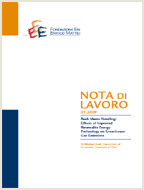Smart Meter Devices and The Effect of Feedback on Residential Electricity Consumption: Evidence from a Natural Experiment in Northern Ireland

10.05.2011
Will Gans, Anna Alberini, Alberto Longo
Q40, Q41, D8
Residential Energy, Electricity Demand, Feedback, Smart Meter, Information
Energy: Resources and Markets
Giuseppe Sammarco
Using a unique set of data and exploiting a large-scale natural experiment, we estimate the effect of real-time usage information on residential electricity consumption in Northern Ireland. Starting in April 2002, the utility replaced prepayment meters with “smart” meters that allow the consumer to track usage in real-time. We rely on this event, account for the endogeneity of price and plan with consumption through a plan selection correction term, and find that the provision of information is associated with a decline in electricity consumption of up to 20%. We find that the reduction is robust to different specifications, selection-bias correction methods and subsamples of the original data. At £15-17 per tonne of CO2e (2009£), the smart meter program delivers cost-effective reductions in carbon dioxide emissions.
***
Suggested citation: Will Gans, Anna Alberini, Alberto Longo, Smart meter devices and the effect of feedback on residential electricity consumption: Evidence from a natural experiment in Northern Ireland, Energy Economics, Volume 36, March 2013, Pages 729-743, ISSN 0140-9883, http://dx.doi.org/10.1016/j.eneco.2012.11.022
